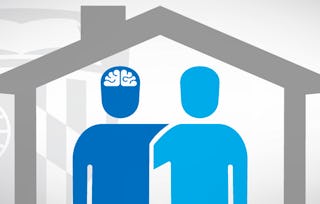This course takes a deep dive into the challenges families and friends of a patient with serious illness face and how you can care for and support them as a provider, social worker or family friend. Supporting Families and Caregivers especially focuses on the children of a patient with serious illness and their caregiver, and teaches you the best way to empower them to get the support they need. By the end of this course, you will be able to provide critical avenues of support for the people who are instrumental to your patients care, wellbeing and quality of life.

Supporting Families and Caregivers

Supporting Families and Caregivers
This course is part of Palliative Care Always Specialization


Instructors: Kavitha Ramchandran
3,677 already enrolled
(44 reviews)
Recommended experience
What you'll learn
Describe several interventions to help with the emotions and coping of being a family member or caregiver of someone with serious illness.
Conduct a basic screen for appropriate adjustment in children.
Define caregiver burden and how to screen for it.
Skills you'll gain
- Nursing and Patient Care
- Medical Social Work
- Clinical Assessment
- Child Health
- Patient Communication
- Patient-centered Care
- Caregiving
- Family Therapy
- Working With Children
- Hospice
- Parent Communication
- Child Development
- Stress Management
- Social Work
- Patient Education and Support
- Pain Management
- Family Support
- Psychosocial Assessments
- Patient Advocacy
- Pediatrics
Details to know

Add to your LinkedIn profile
See how employees at top companies are mastering in-demand skills

Build your subject-matter expertise
- Learn new concepts from industry experts
- Gain a foundational understanding of a subject or tool
- Develop job-relevant skills with hands-on projects
- Earn a shareable career certificate

There are 5 modules in this course
Welcome to Supporting Families and Caregiver, the fourth course in the Palliative Care Always specialization. This course takes a deep dive into the challenges families and friends of a patient with serious illness face and how you can care for and support them as a provider, social worker or family friend. Supporting Families and Caregivers focuses especially on the children of a patient with serious illness and their caregiver, and teaches you the best way to empower them to get the support they need. By the end of this course, you will be able to provide critical avenues of support for the people who are instrumental to your patients care, wellbeing and quality of life. This module will provide you with information on the course structure and first steps.
What's included
3 readings2 assignments
This module provides a review of the key concepts learned in the courses Essentials of Palliative Care, Symptom Management in Palliative Care, and Transitions in Care from Survivorship to Hospice. We realize that some learners are interested in only completing specific courses while others are moving through the entire specialization. The following videos are meant as a review for those who have not completed the other courses. You are not required to watch these videos if you feel you have a strong handle on the material. You can check your knowledge with the ungraded quiz in the next section and review the summary videos if necessary. Also contained in this module are the Sarah case study videos from Essentials of Palliative Care, Symptom Management in Palliative Care, and Transitions in Care from Survivorship to Hospice for those who want to review her story.
What's included
18 videos3 readings1 assignment
Clinicians can support families experiencing cancer by regularly assessing both the child’s adjustment and the parents’ ability and confidence in helping their children cope. Child and family guidance professionals can act as a resource. This module will review basic screening and assessment of child adjustment, and offer practical strategies to help families talk about difficult topics and maintain a sense of normalcy during serious illness.
What's included
5 videos7 readings4 assignments1 discussion prompt
In this module we discuss the caregiver experience in detail, learn how to screen for caregiver distress and provide advice to support caregivers.
What's included
4 videos6 readings3 assignments1 discussion prompt3 plugins
Congratulations on completing the course content. You have a few more step to complete the course. First review your reflection, next complete a peer-reviewed course project and then take the final exam. We hope you have enjoyed the course and look forward to seeing you in other classes!
What's included
1 reading2 assignments1 peer review
Earn a career certificate
Add this credential to your LinkedIn profile, resume, or CV. Share it on social media and in your performance review.
Instructors


Offered by
Explore more from Patient Care
 Status: Preview
Status: PreviewUniversidad Nacional de Colombia
 Status: Free Trial
Status: Free TrialStanford University
 Status: Preview
Status: PreviewUniversidad Nacional de Colombia
 Status: Preview
Status: PreviewJohns Hopkins University
Why people choose Coursera for their career

Felipe M.

Jennifer J.

Larry W.

Chaitanya A.
Learner reviews
- 5 stars
79.54%
- 4 stars
6.81%
- 3 stars
4.54%
- 2 stars
0%
- 1 star
9.09%
Showing 3 of 44
Reviewed on Aug 10, 2023
Thank you for providing insightful knowledge through this course.

Open new doors with Coursera Plus
Unlimited access to 10,000+ world-class courses, hands-on projects, and job-ready certificate programs - all included in your subscription
Advance your career with an online degree
Earn a degree from world-class universities - 100% online
Join over 3,400 global companies that choose Coursera for Business
Upskill your employees to excel in the digital economy
Frequently asked questions
Dates and Duration Original Release Date: 09/30/2023 Expiration Date: 09/29/2026 Estimated Time to Complete: 10 hours Accreditation In support of improving patient care, Stanford Medicine is jointly accredited by the Accreditation Council for Continuing Medical Education (ACCME), the Accreditation Council for Pharmacy Education (ACPE), and the American Nurses Credentialing Center (ANCC), to provide continuing education for the healthcare team. Credit Designation American Medical Association (AMA) Stanford Medicine designates this enduring material for a maximum of 10.0 AMA PRA Category 1 CreditsTM. Physicians should claim only the credit commensurate with the extent of their participation in the activity. American Nurses Credentialing Center (ANCC) Stanford Medicine designates this enduring material activity for a maximum of 10.0 ANCC contact hours. ASWB Approved Continuing Education Credit (ACE) – Social Work Credit As a Jointly Accredited Organization, Stanford Medicine is approved to offer social work continuing education by the Association of Social Work Boards (ASWB) Approved Continuing Education (ACE) program. Organizations, not individual courses, are approved under this program. State and provincial regulatory boards have the final authority to determine whether an individual course may be accepted for continuing education credit. Stanford Medicine maintains responsibility for this course. Social workers completing this activity receive 10.0 enduring material continuing education credits. American Academy of Physician Assistants (AAPA) - Enduring Materials Stanford Medicine has been authorized by the American Academy of PAs (AAPA) to award AAPA Category 1 CME credit for activities planned in accordance with AAPA CME Criteria. This enduring activity is designated for 10.0 AAPA Category 1 CME credits. Approval is valid until 09/29/26. PAs should only claim credit commensurate with the extent of their participation. Disclosures Stanford Medicine adheres to the Standards for Integrity and Independence in Accredited Continuing Education. There are no relevant financial relationships with ACCME-defined ineligible companies for anyone who was in control of the content of this activity.
View more at https://stanford.cloud-cme.com/course/courseoverview?P=0&EID=47065
To access the course materials, assignments and to earn a Certificate, you will need to purchase the Certificate experience when you enroll in a course. You can try a Free Trial instead, or apply for Financial Aid. The course may offer 'Full Course, No Certificate' instead. This option lets you see all course materials, submit required assessments, and get a final grade. This also means that you will not be able to purchase a Certificate experience.
When you enroll in the course, you get access to all of the courses in the Specialization, and you earn a certificate when you complete the work. Your electronic Certificate will be added to your Accomplishments page - from there, you can print your Certificate or add it to your LinkedIn profile.
More questions
Financial aid available,
¹ Some assignments in this course are AI-graded. For these assignments, your data will be used in accordance with Coursera's Privacy Notice.

